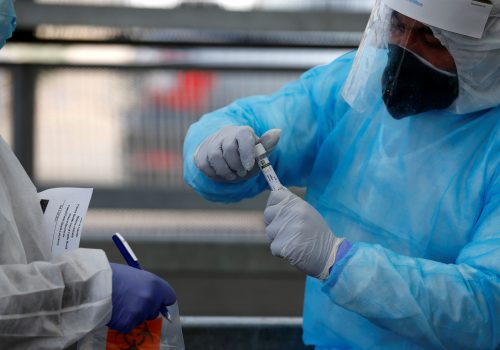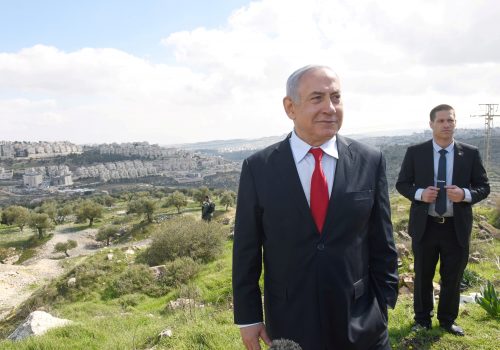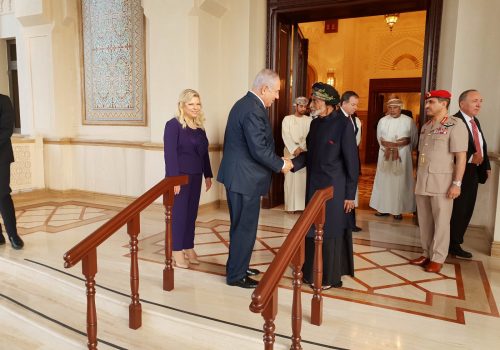The battlefield over West Bank annexation
I went to Ramallah to get a sense of whether all hell will break loose on July 1 if Israeli Prime Minister Benjamin Netanyahu declares sovereignty over a major chunk of the West Bank. That was his promise before Israel’s March 2 election, a move encouraged in US President Donald Trump’s peace plan even though previous administrations have opposed such a step for the past half-century.
The Arab League, most European countries, and presumptive Democratic presidential nominee Joe Biden have condemned unilateral annexation, which could encompass as much as 29 percent of the territory Israel captured in the 1967 Six-Day War. Palestinian President Mahmoud Abbas says it will kill all prospects for a two-state solution. Jordan’s King Abdullah says it imperils the peace agreement his father, King Hussein, signed with Israel in 1994.
By contrast, activists were hard-pressed this month to bring more than a few hundred protesters into the streets of Ramallah, headquarters of the Palestinian Authority. More came out in Tel Aviv for a demonstration against Netanyahu’s plans, where police estimated that Israel’s left-wing opposition mustered a crowd of 6,000.
If Israeli lawmakers believe they can annex land without significant consequences, the United Arab Emirates’ (UAE) ambassador to Washington, Yousef Al Otaiba sought to make clear that it would be a disaster for the country’s warming relations with the UAE and other Gulf Arab countries.
“We have promoted engagement and conflict reduction, helped to create incentives—carrots rather than sticks,” Al Otaiba wrote in an unprecedented Hebrew-language column for the Yedioth Aharonoth newspaper. “Annexation will certainly and immediately upend Israeli aspirations for improved security, economic, and cultural ties with the Arab world and with [the] UAE.”
It took two buses and $1.75 to get from my place in Jerusalem’s leafy Old Katamon neighborhood to the Qalandia checkpoint, a traffic-jammed nightmare of concrete surveillance cameras and rifle-gripping soldiers where Israel meets semi-autonomous Palestine. Walking through metal-cage turnstiles, I emerged on the other side of Israel’s security barrier that stretches more than one hundred miles across the West Bank frontier. For $10, a yellow taxi took me swiftly to the Ramallah headquarters of Palestinian Authority Prime Minister Mohammed Shtayyeh for the June 9 press conference.
Shtayyeh’s walled complex sits diagonally across from the intersection of Emil Habibi Street and Yahya Ayyash Street, a fitting metaphor for the choices Palestinians face. Habibi, who died in 1996, was the author and member of Israel’s parliament. His satirical novel, The Secret Life of Saeed: The Pessoptimist, articulates the conflicted feelings of Israel’s 1.9 million Arab citizens. Ayyash, nicknamed “the engineer,” was the chief bombmaker for militant group Hamas during a wave of suicide attacks in Israel. He was killed when his mobile phone, booby-trapped by Israeli operatives, exploded in his hands.
Inside the government compound, Shtayyeh told reporters that Palestinians will fight annexation by declaring statehood, mobilizing all diplomatic channels, and breaking ties with Israel—not through the kind of violence in previous uprisings, known as intifadas.
“We will continue to maintain law and order,’’ said Shtayyeh, a 62-year-old economist who was appointed prime minister last year.
Despite the UAE’s warning, Israel may at least nip at the West Bank as Netanyahu seeks a green light from President Trump to assert sovereignty over three settlement blocs. They include Ma’ale Adumim (population 50,000) and Gush Etzion (population 40,000), which are garden suburbs of Jerusalem. The third is Ariel (population 65,000)—a half-hour drive from Tel Aviv. Plans to annex the Jordan Valley could be stalled.
“Netanyahu knows that his plan is a red flag for most of the international community,” Shalom Lipner, a non-resident senior fellow of the Atlantic Council and past adviser to seven Israeli prime ministers, told me. “He will be looking to calibrate Israel’s steps, with an eye toward minimizing the possibility of punitive measures being taken against the country.”
Outwardly, the process of turning settlement clusters into municipalities governed by ordinary Israeli law would amount largely to changing the signage. For the residents, themselves, it would cut red tape, such as regularizing building permits, which now require approval by military authorities and are subject to political considerations that limit settlement construction, according to Maurice Hirsch, Israeli’s former chief military prosecutor, who lives in Gush Etzion.
Over the last twenty years, Palestinian negotiators have operated with the unofficial understanding that some Jewish settlements would remain adjacent to the so-called “Green Line” that separates sovereign Israel from occupied territory. Shtayyeh said Palestinians consider all 132 settlements illegal but recognize that there could be “minor modification of borders where necessary” in negotiations.
But formal peace talks haven’t taken place in six years. Palestinians have rejected any negotiations mediated by the Trump administration. For most of the 2.5 million Palestinians in the West Bank, annexation won’t materially alter day-to-day life and calls for protest often elicited little more than a yawn. Amid the international furor generated by Netanyahu’s plan, few Palestinians believe they can prevent it, even if most countries consider the West Bank occupied territory.
“There will clearly be bumps on the road but localized intifadas will be limited, if they erupt,” Ghanem Nuseibeh, a Jerusalem-born Palestinian who runs a London-based political risk consultancy, explained to me.
In Ramallah, Shtayyeh is working the phones, trying to intensify pressure on Israel and limit the amount of land Netanyahu feels politically able to annex.
“Patience is the name of the game,” he told reporters. “I know our people are ready for sacrifices.’’
Inside the hall, Shtayyeh’s preaching of restraint echoed the ambivalence toward Israel emblemized by Emil Habibi. Outside, the street named after bombmaker Yahya Ayyash presents a perilous alternative.
Jonathan H. Ferziger is a writer and researcher who covered the Middle East for more than 30 years at Bloomberg News and UPI. Follow him on Twitter: @jferziger.
Image: Israeli border police members stand guard following an incident at Qalandia checkpoint in the Israeli-occupied West Bank September 18, 2019. REUTERS/Mohamad Torokman


